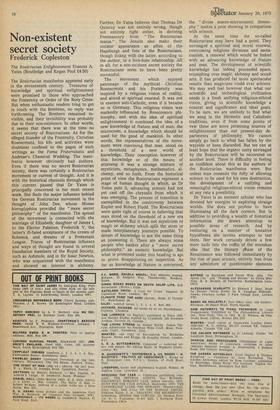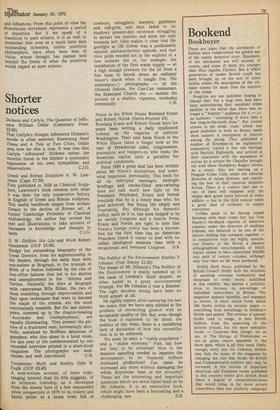Non-existent secret society
Frederick Copleston
The Rosicrucian Enlightenment Frances A. Yates (Routledge and Kegan Paul £4.50) The Rosicrucian manifestos appeared early in the seventeenth century. Treasures of knowledge and spiritual enlightenment were promised to those who approached the Fraternity or Order of the Rosy Cross. But when enthusiastic readers tried to get in touch with the Brethren, no reply was forthcoming. The Brothers remained invisible, and their invisibility was probably due to their non-existence. In other words, it seems that there was at the time no secret society of Rosicrucians. As for the alleged founder of the Fraternity, Christian Rosencreutz, his life and activities were doubtless confined to the pages of such writings as the Fama Fraternitatis and Andreae's Chemical Wedding. The manifestos however obviously had authors. Even if there was no secret Rosicrucian society, there was certainly a Rosicrucian movement or current of thought. And it is with the historical channels through which this current passed that Dr Yates is principally concerned in her most recent work. She finds the major influence behind the German Rosicrucian movement in the thought of John Dee, whose Monas hieroglyphica provided the "more secret philosophy" of the manifestos. The spread of the movement is connected with the marriage of Elizabeth, daughter of James I, to the Elector Palatine, Frederick V, the latter's ill-fated acceptance of the crown of Bohemia, and dreams of a Protestant League. Traces of Rosicrucian influence and ways of thought are found in several foundation members of the Royal Society, such as Ashmole, and in Sir Isaac Newton, who was acquainted with the manifestos and showed an interest in alchemy. Further, Dr Yates believes that Thomas De Quincey was not entirely wrong, though not entirely right either, in deriving Freemasonry from "The Rosicrucian mania." The Jesuits also make their sinister appearance as allies of the Hapsburgs and foes of the Rosicrucians, though linked with the latter, according to the author, in a love-hate relationship. All in all, for a non-existent secret society the Rosicrucians seem to have been pretty successful.
The movement which enjoyed patronage of the mythical Christian Rosencreutz and his Fraternity was inspired by a religious vision of reality, and aimed at spiritual renewal. It was not in essence anti-Catholic, even if it became so in Germany. This religious vision was markedly influenced by Renaissance philosophy, and with the idea of spiritual enlightenment it combined the idea of a new knowledge of Nature and of man, the microcosm, a knowledge which should be used for the good of mankind. In other words, the representatives of the movement were convinced that man stood on a threshold of a new world of knowledge. Their conception 'however of this knowledge or of the means of attaining it was a strange mixture of mysticism, metaphysics, mathematics, alchemy, and so forth. From the historical point of view the Rosicrucians represent a stage of human thought in which, as Dr Yates puts it, advancing science had not yet cast off the chrysalis from which it was emerging. The process of transition is exemplified in the controversy between Kepler and Robert Rudd. The Rosicrucians were quite right of course in believing that man stood on the threshold of a new era of knowledge. But it was not mysticism or magic or alchemy which split the atom or made interplanetary journeys possible. To dream of knowledge is not the same thing aS possessing it. There are always some people who hanker after a "more secret philosophy," an esoteric knowledge. But what is promised under this heading is apt to prove disappointing on inspection. As far as knowledge of Nature is concerned, the "divine macro-microcosmic theosophy" makes a poor showing in comparison with science.
At the same time the so-called Rosicrucians may have had a point. They envisaged a spiritual and moral renewal, overcoming religious divisions and sectarianism, a renewal which would be linked with an advancing knowledge of Nature and man. The development of scientific knowledge has indeed proceeded apace, triumphing over magic, alchemy and occult arts. It has produced far more spectacular results than magicians could ever achieve. We may well feel however that what our scientific and technological civilisation• needs is a fresh unifying religious-ethical vision, giving to scientific knowledge a context and significance and ideal goals. To be sure, we are unlikely to find what we need in the Hermetic and Cabalistic traditions, even if from some points of vew these are more promising sources of enlightenment than our present-day departments of philosophy. We cannot simply go back to what has fallen by the wayside or been discarded. But we can at least hope that the organic unity envisaged by the Rosicrucians will be recovered on another level. There is difficulty in feeling as confident about this as the authors of the Rosicrucian manifestos were. But unless man commits the folly of allowing science to be used for his own destruction, the development of a unifying and meaningful religious-ethical vision remains at any rate a possibility.
Dr Yates is an eminent scholar who has devoted her energies to exploring strange worlds. She does not profess to have illuminated all the dark corners. But in addition to providing a wealth of historical information she draws attention to possible areas of research. And by venturing on a number of tentative hypotheses she invites attempts to test them. Her work certainly drives a few more nails into the coffin of the mistaken idea . that the literary phase of the Renaissance was followed immediately by the rise of pure science, entirely free from any admixture of questionable elements and influences. From this point of view the Rosicrucian movement represents a period of transition. But if we speak of a transition to pure science, it is as well to remember that even at a much later date outstanding scientists, unlike positivist Philosophers, have often been men of vision, whose thought has passed well beyond the limits of what the positivist would regard as pure science.



































 Previous page
Previous page